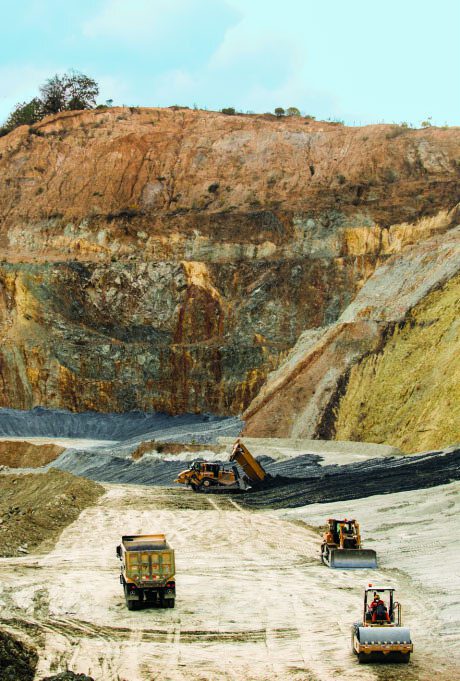
The Government of Canada has unveiled an enhanced corporate social responsibility (CSR) strategy, a successor to its first CSR strategy released in 2009. The new strategy does more to encourage responsible behaviour abroad; it also has more muscle to penalize resource companies that won’t commit to prescribed best practices and disputeresolution processes.
The new strategy, Doing Business the Canadian Way: A Strategy to Advance Corporate Social Responsibility in Canada’s Extractive Sector Abroad, was released in late 2014. Under it, responsible companies will be eligible for “enhanced Government of Canada economic diplomacy,” such as letters of support, advocacy efforts in foreign markets and participation in government trade missions. Companies that don’t follow the rules risk losing these and other benefits, including potential support from Export Development Canada, the financing Crown corporation.
The carrot-and-stick approach is a significant departure from the 2009 initiative, which was widely criticized as being weak and ineffective. Indeed, most complaints filed with the first government-appointed CSR counsellor were not even investigated because companies declined to participate in the voluntary process.
Alexandra Lamont, CSR unit deputy director with the Department of Foreign Affairs, Trade and Development, helped draft the enhanced strategy. She says the changes flowed from a review of the 2009 effort, which recommended that trade commissioners work more closely with companies on the ground.
To that end, the gover n ment has pledged increased support and training to help trade commissioners and their staff detect issues of concern. If warranted, these issues will be brought to the attention of the CSR commissioner, who will work to prevent and resolve disputes in their early stages.
The Office of the CSR Commissioner was also given a stronger mandate to promote CSR guidelines and to advise companies on how to incorporate the guidelines into their daily operations.
“This Office is unique,” Lamont says. “I’m not aware of any other country that has it.”
Lamont says another lesson learned from the past is the need for clear protocols. Companies working abroad need to understand the respective roles of the trade commissioners and the CSR counsellor, as well as the handover process for when issues escalate into disputes.
Disputes that can’t be resolved locally or with the help of the CSR commissioner will now be referred to Canada’s National Contact Point (NCP), a respected disputeresolution mechanism based on the OECD Guidelines for Multinational Enterprises, produced by the Organisation for Economic Co-operation and Development.
“If companies refuse to participate, their names will be made public,” Lamont says, citing the case of China Gold International Resources Corp. as a recent example.
The ability to refer disputing parties to the NCP allows the new CSR commissioner, Jeffrey Davidson, to focus on preventing minor issues from escalating into major problems. As a first step, he believes that companies of all sizes must be familiar with and prepared to implement globally recognized CSR standards.
“I think it’s important to help companies understand what the standards mean practically, and also what the expectations of the Government of Canada [are],” Davidson says. “Companies must get their heads around human rights, and what it means to build relationships [and to] respect local culture and sacred and protected areas.”
The list of benchmark CSR guidelines has grown since 2009 to include the United Nations’ Guiding Principles on Business and Human Rights and the OECD’s Due Diligence Guidance for Responsible Supply Chains of Minerals from Conflict-Affected and High-Risk Areas. The enhanced strategy also has flexibility to build awareness of Canadian CSR guidance, notably the Mining Association of Canada’s Towards Sustainable Mining program and the Prospectors and Developers Association of Canada’s e3 Plus program.
Davidson, a former mining executive with international experience, says he understands the challenges small companies face working abroad. Nevertheless, he says there are “too many examples” of juniors that have seen large companies option their projects and walk away because things went sour on the ground.
Davidson urges juniors to provide CSR training to exploration crews. “They are often the first point of contact, and it’s critically important for this contact to happen in a positive way. Geologists have to be prepared to listen, and understand what people say to them, and understand the protocol of entering a community and who to see.”
Managing community expectations is also important, Davidson says, particularly in remote areas with minimal government presence. He suggests that social investments be made in a sustainable manner, through stakeholder partnerships and collaboration. “The goal should be to build capacity in a community.”
One change Davidson is hoping for is for companies, particularly juniors, to come forward and seek assistance when issues arise despite their best efforts. “The idea is to not let [the issues] simmer and escalate,” Davidson says, “because if we see something going on, through any corridor, it is incumbent on us to work with stakeholders, companies and local governments to facilitate a resolution.”
For proactive companies, the opportunity to resolve issues or refute meritless allegations in an informal setting is obviously more appealing than the prospect of a full-blown dispute before the NCP. Companies that won’t commit to either of these processes face consequences beyond the loss of reputation and withdrawal of government support in foreign markets. Findings of non-compliance could also be taken into account during the due-diligence process, as most financial institutions, including all five of Canada’s chartered banks, have adopted their own CSR policies and principles.
